ALLIGATOR
BEHAVIOR page 5e: BABY ALLIGATORS--page
5 page 1 2 3 4 6 7 8 9 10 11 12
This
page was born 11/29/2012. Rickubis designed it. Last
update: 6/27/2022
Images
and contents on this page copyright � 2004 -2022 Richard M.
Dashnau
6/22/2008--I
was watching the activity on 40-Acre lake. and I noticed an
alligator swimming
from the center of the lake towards the nest on the island.
The
alligator moved steadily towards the bank near the nest, then
stopped (see
"WHERE IS IT GOING", "TOWARDS NEST", AND STOP NEAR" below)
The
alligator's head is visible at the lower left of the picture (STOP
NEAR),
by edge of the bank.
-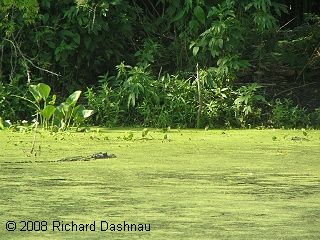 -
-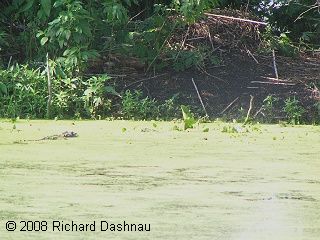 -
-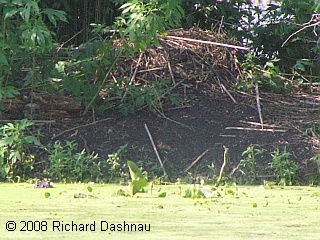 -
-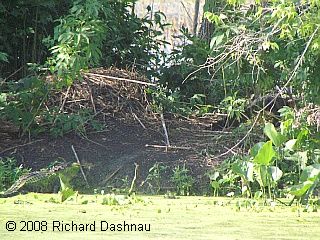 --
--
WHERE IS IT GOING?
SWIMMING TOWARDS NEST
STOP
NEAR THE NEST
YAHH! IT'S MOM!
I
thought that this was the female who had made the nest. I glanced
down
at my camera, checked to be sure it was going to shoot a 5-shot
burst of
pictures. I intended to catch a sequence of
the alligator climbing up to
the nest (My video camera was still packed.).
When
I looked up, the alligator was on the island...and another
alligator was
crossing the island going past the nest!
Since I was looking down, I missed
the beginning of the action, so I don't know if the fleeing
alligator was
the one I'd seen swimming. The alligator fled across the island
(see YAHH!,
CHASED, and JUST KEEP above), and then the pursuing alligator
turned laid
down to rest (see AND DON'T COME BACK below). After a short while,
the
alligator turned around and laid in
front of the nest, where she remained
for quite a long time. Later in the day, she began gaping. (see
MOM GUARDING,
and WARM below).
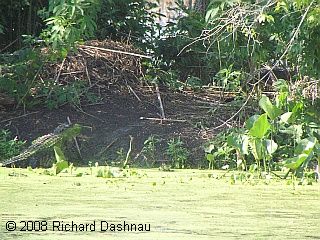
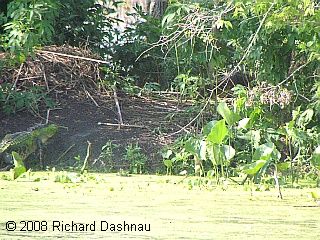 -
-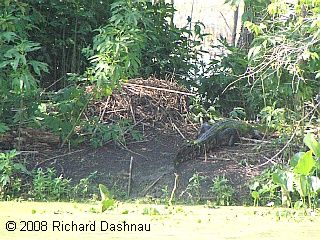 -
-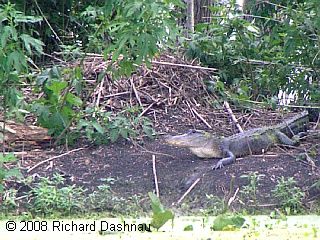 -
-
CHASED
OVER THE ISLAND
JUST KEEP GOING!
AND DON'T COME BACK!
MOM GUARDING THE
NEST
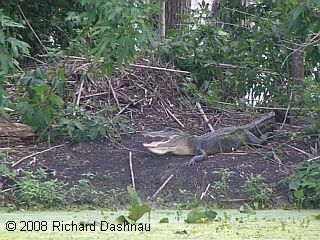
MOM GETTING WARM
Note
that both alligators were out of the water--and one was almost
across the
island--in the time it took me to look down and my camera, read
the display,
and look back up again. I have
reviewed all the photos I took at
that time, especially the ones of the alligator's head in front of
the
nest, but I cannot find any sign of more than one alligator in
front of
the nest. Yet, the alligator
in front had to have left the water
right then, since I can see the wet trail in the mud that wasn't
there
before the alligator crossed.
Even
the the movement was rapid, it was not violent. There
was no splash marking
the alligators leaving the water, and no sudden movements. The
alligators
simply walked quite quickly to where they were going. I
wonder what
the other alligator
wanted at the nest, if it wanted anything. Did it want
to use the nest? Did it see a nice clear bank to bask on? Was it
just caught
by surprise the annoyed mother as it was foraging and just
left the water
as the quickest escape?
This
is a good example of how quickly and quietly a protective
alligator can
move while guarding her nest.
I'm
looking forward to watching all our nests this year.
6/15/2008--Here
it is, another nesting season arrives at Brazos Bend State Park
(and I
suppose the rest of Texas as well). Walking around one of the
lakes, I
could pick out an alligator nest on
one of the islands. Today's RICKUBISCAM
shows the nest as I saw it in the morning. The alligator nest is a
pile
of plants and mud, scraped together from nearby. Since the nest is
piled
from the
scrapings, the area around the nest tends to be a bit cleaner--as
if something had scraped the ground clean. And of course, the
alligator
has done that. A little later in the day, I heard that so far
two other
nests have been found in the park. I might have found another one
besides
those, but I'll have to check. All three nests are easily visible
(if you
know what to look for) from our trails. The
three images below show the
nest on the island. The first two were taken in the morning, the
last one
(MOM GUARDING) was taken later in the day.
- -
-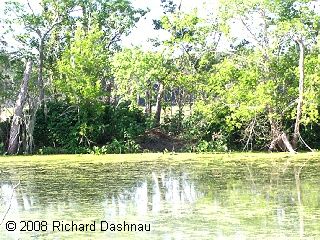 -
-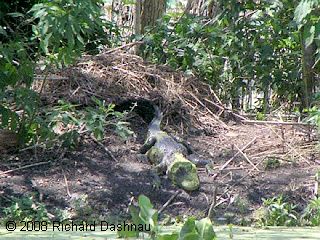
NNEST
ISLAND!
THE
NEST ON NEST
ISLAND
MOM
GUARDING THE NEST
2/17/2008--The
park had endured the swift cold front and included rain and wind
Saturday
evening. Sunday morning (today) was very nice, although cool.
Alligators
were moving around, and
as the sun rose into the sky, they started getting
on land.
I decided
to look for the baby alligators that I'd seen last weekend. This
time,
there were a few lying on top of their mother. The female
and babies
were still at least 20 yards away, though, so the pictures aren't
as clear
as I'd like (see BABIES RIDE 1,2 below). The RICKUBISCAM image is
cropped
from one of the photographs.
I shot some video and editied a short
clip which shows the mother moving around, and the babies moving
off her
back. This link is for the short
video
clip (wmv 7.3 mb). The last image below
(BABIES RIDE 3)
is a frame from that video clip. I believe that the female
and babies
were staying somewhere under the water near that spot. Through the
coldest
days, I didn't see any alligators
over there, but with all the plant growth,
she could have just exposed her nose and I wouldn't have seen
it.
Whenever the temperature got a little warmer, the alligator would
lie on
top of the plant growth.
- -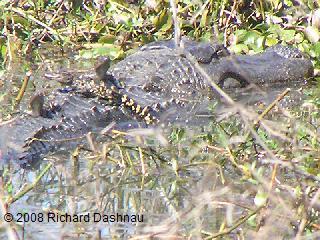 -
- 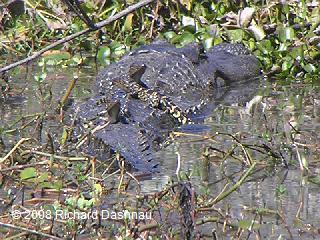 -
-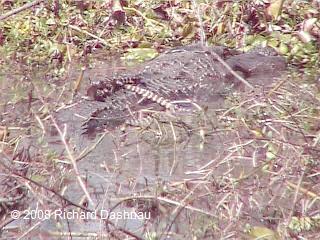 --
--
BABIES RIDE 02/18/08 1
BABIES RIDE 02/18/08 2
BABIES RIDE 02/18/08 3
2/10/2008--At
around 2:30pm, I was back at 40-Acre Lake, near the first island.
This
is where an alligator nest was last year, where the female had
been with
her babies for some weeks after,
and where I'd watched an otter swim across
on December 30, 2007 (about a month ago). After that otter had
crossed,
I went out for the next day or so to see if an otter would cross
again.
It didn't,
but while I was waiting, I thought I'd heard an intermittant
baby alligator chirps. The chirps seemed to be coming from
Pilant
Lake, but I never could find anything. There was a large adult in
the area,
though.
Today,
that alligator (or one of similar size) was lying on top of the
plants
about 20 yards away. I decided to look near it, and a spotted the
baby
alligators! I didn't hear any chirping, but there
they were. The babies
were pretty far away, but I shot a little video and some photos
anyway.
You can tell from these that the baby gators were really hard to
spot (FOUR
GATORS and GATORS
CIRCLED, below). This link is for the short
video
clip (wmv 7.5 mb). Look closely, and you'll see some of the
babies
move, then I panned the camera quickly over the female and back.
- - ---
---
FOUR GATORS
FOUR GATORS CIRCLED
-  ---
--- abies0210zm1c.jpg
--
abies0210zm1c.jpg
--
TWO GATORS IN "ZOOM 1"
TWO GATORS IN "ZOOM 2"
07/01/2007---Spring
has changed into summer. BBSP has maintained good water levels in
all of
the lakes, although it has dropped a bit. I've been busy putting
programs
together for showing at
places outside the park--still strictly for educational
purposes. I'm not paid for them. However, alligators have been
nesting.
Today's RICKUBISCAM shows an alligator near a nest on one of our
islands.
-----------------------------------------------------------------------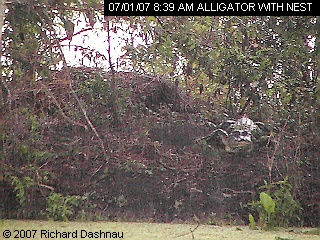
------------------------------------------------------------------------------------MOTHER
ALLIGATOR AND NEST
3/05/2006--(update
added 01/08/2017)
I was on the West loop of Elm Lake trail when I saw a Great Blue
Heron
on one of the islands. It appeared to be stalking something, so I
set
up the video
camera I had at the time. When the heron caught its prey,
I started filming. I thought it had caught a fish. But when I
zoomed in
with the video camera, I could see that the Heron had caught a
baby
alligator! While I was filming, I noticed an adult alligator
moving
towards the Heron, which flew off long before the alligator could
reach it. In the 10 years since I shot this video clip, I've never
had
a
chance to witness another Great Blue Heron with a baby
alligator--although others have. Alligator nests at Brazos Bend
State
park average about 30 eggs per nest. If all those eggs
hatch, only
one
will possibly survive the 3 years after it hatched. Most of the
losses are probably due to predation by the many wading birds at
the
park; like this Great Blue Heron. The two images below are frames
from
the video clip I shot, and the clip can be seen at this
link(mp4).
------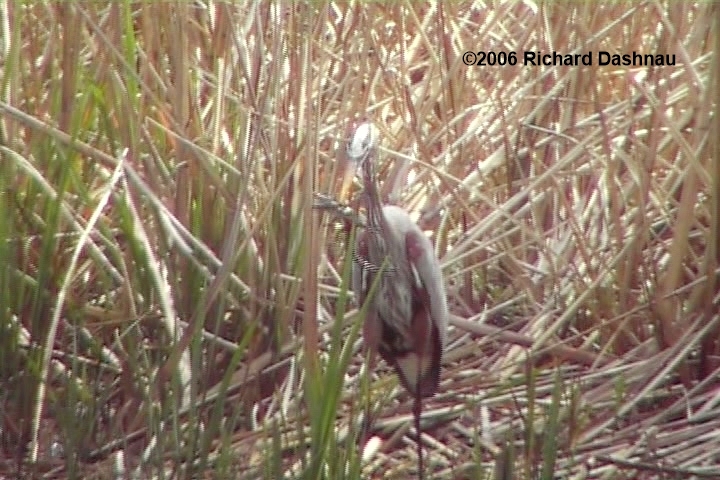 ---------------
---------------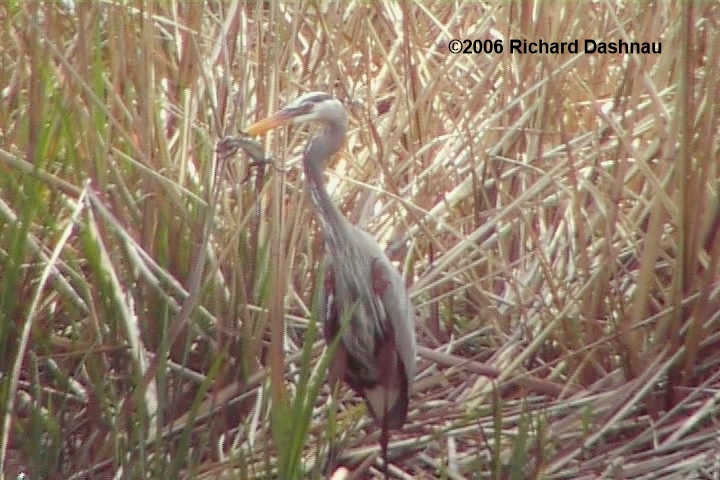 ----
----
BLUE
HERON WITH BABY ALLIGATOR 1
BLUE HERON WITH BABY ALLIGATOR
2
And,
this page shows alligators at the park,
on land, near various landmarks at the park.
Go back to my main alligator
page, Alligators
Go
back to my home page, Welcome
to rickubis.com
Go
back
to the RICKUBISCAM
page.
Go
back
to the See the
World
page.
 -
- -
- -
- --
--

 -
- -
- -
-












